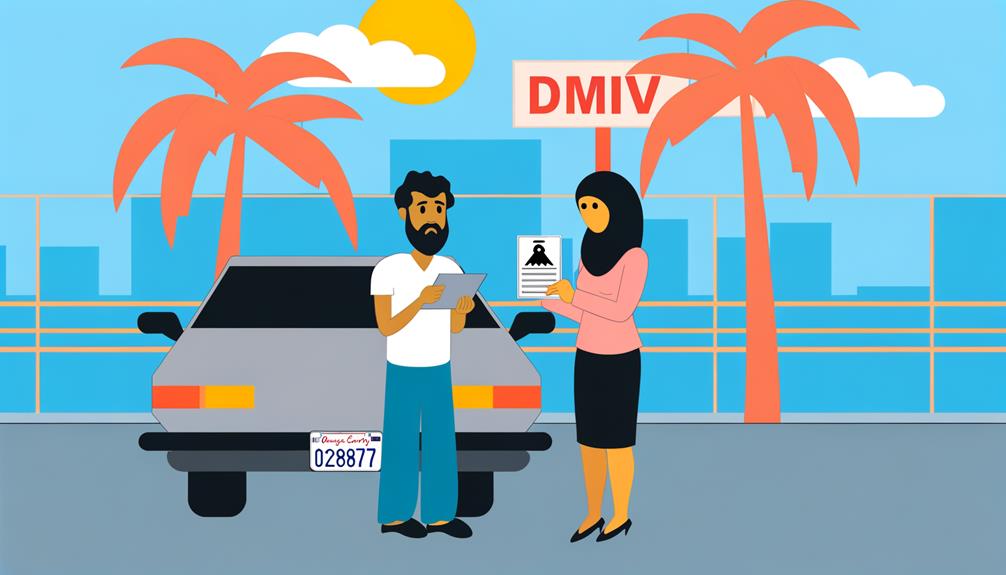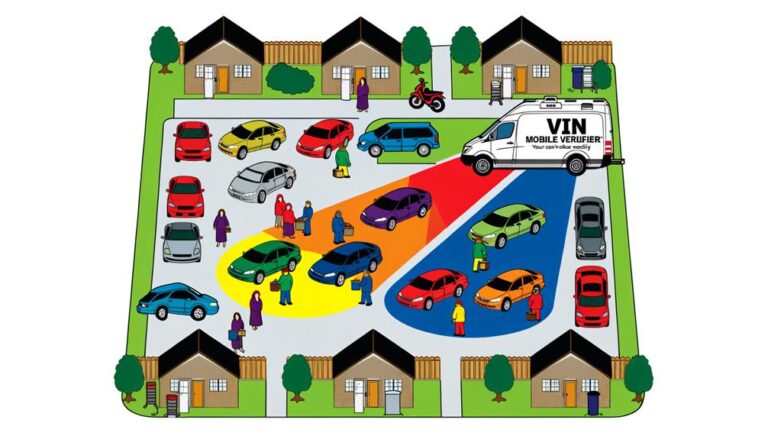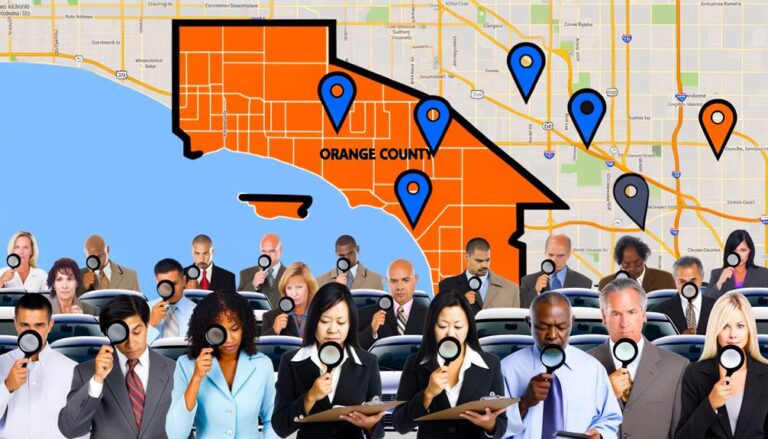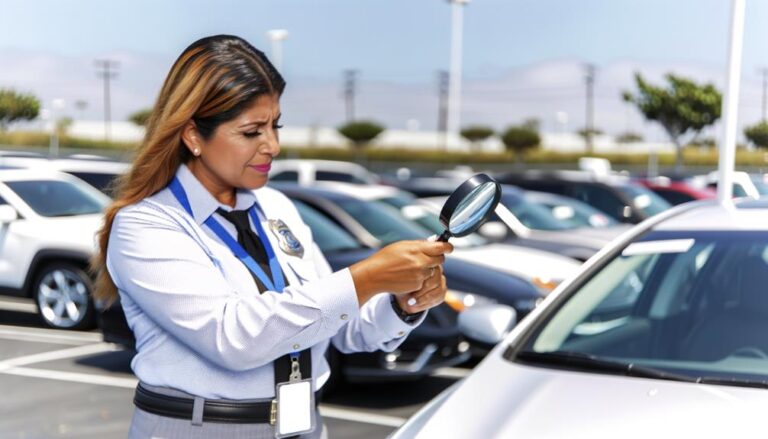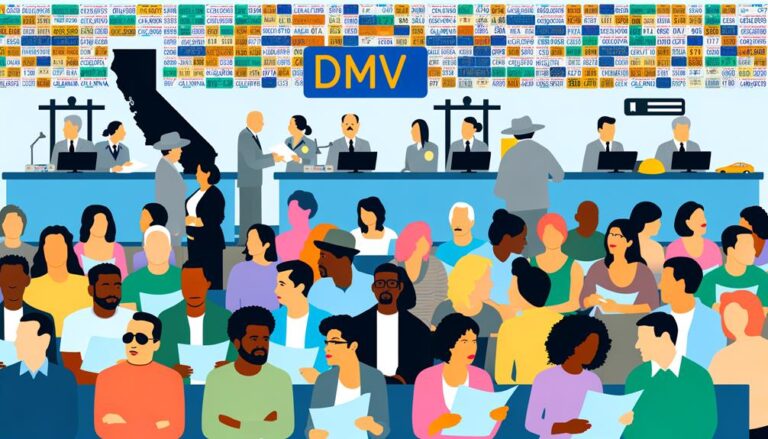To register your out-of-state car in Orange County, you'll first prove your residency through documents like utility bills or rental agreements. Within 20 days of moving, ensure you have your out-of-state title, registration certificate, and a California insurance proof ready. Next, obtain a smog certificate from a licensed station unless your car is exempt, and complete the Vehicle Verification Form (REG 31). Submit these alongside Form REG 343 during your DMV visit, scheduled ahead to avoid long waits. Be mindful of the fees, which start at $74, and include potential additional charges. Understanding these steps will significantly ease the process as you proceed.
Residency Requirements

Before you can register your out-of-state car in Orange County, you'll need to prove your residency in California. Establishing residency isn't just about having a place to stay; it's about integrating your life here.
Whether you're renting or buying a home, securing employment in the state, or claiming tax benefits as a California resident, these actions demonstrate your intent to reside permanently or for an extended period.
Additionally, for those moving states, it's important to register within 20 days to avoid potential late fees which can add unnecessary costs to your move.
To meet the DMV requirements, you'll need to provide proof of residency. This could be utility bills, rental agreements, or bank statements with your California address.
Be sure to gather these documents early to smooth your path at the DMV. For out-of-state college students, check for exemptions you might qualify for, as your requirements could differ.
Once your residency is established, it's crucial to make an appointment with the DMV.
Don't forget to fill out the vehicle registration form prior to your visit. Bringing all necessary documents, including your proof of insurance and out-of-state title, will ensure that your registration process is as seamless as possible.
Vehicle Preparation Steps
Once you've established your residency in California, your next step involves preparing your vehicle for registration. Before you head to the Department of Motor Vehicles (DMV), make sure you've gathered all the necessary documents and met the preliminary requirements. This ensures a smoother process and avoids unnecessary delays.
Here's a concise checklist to guide you:
- Have your out-of-state title and registration certificate ready. These documents are crucial as they prove your previous vehicle registration and ownership.
- Obtain proof of insurance from a California-based company. This is essential to meet the state's requirements for vehicle registration. Ensure the policy complies with California's minimum liability coverage standards.
- Complete the Application for Title or Registration (Form REG 343). You'll need to fill out this form accurately to initiate the vehicle registration process in California. It asks for detailed information about your vehicle and your out-of-state registration status.
Additionally, keep your out-of-state license plates, as the DMV might request them.
With these steps checked off, you're well on your way to successfully registering your vehicle in Orange County and embracing your newfound freedom on California roads.
Smog Certificate Acquisition

Securing a smog certificate is an essential step in registering your out-of-state vehicle in Orange County. To acquire a smog certificate, you'll need to visit a licensed California smog check station. Remember, this certificate validates that your vehicle meets the local emissions standards and is crucial for the vehicle registration process.
Additionally, if your vehicle is from out of state or has undergone significant modifications, a VIN verification may also be required to ensure compliance with state regulations.
The smog check fee can vary, typically ranging from $30 to $80. If your car is less than four years old, you're also subject to a $20 smog abatement fee instead of the regular smog inspection fee. This fee supports air quality programs and exempts you from the biennial smog check requirement until your vehicle is older.
Ensure that the smog check is completed within 90 days before initiating the registration process, as the certificate's validity is limited to this period. This timing is critical to avoid any delays in your registration process.
For vehicles produced after 1976 (gasoline) or after 1998 (diesel), regular smog inspections are mandated every two years in most California regions. Keeping up with these checks not only aids in maintaining optimal vehicle performance but also ensures compliance with state environmental regulations.
Vehicle Verification Process
After obtaining your smog certificate, the next step in registering your out-of-state vehicle in Orange County is completing the vehicle verification process. This involves a physical inspection and a bit of paperwork to ensure everything is in order.
You're not just ticking boxes; you're securing your freedom to drive.
Here's what you need to focus on:
- Submit Form REG 31: This form is essential for the DMV to conduct a physical inspection of your vehicle. They'll check the VIN, engine number, and odometer reading against your out-of-state title to confirm their authenticity.
- Prepare Necessary Documents: Have your smog inspection certificate, proof of insurance, and out-of-state title at hand. Ensuring these documents are ready will streamline the process.
- Timeliness is Key: Complete your vehicle verification within 20 days of establishing residency in California to avoid unnecessary late fees.
Registration Application Procedure
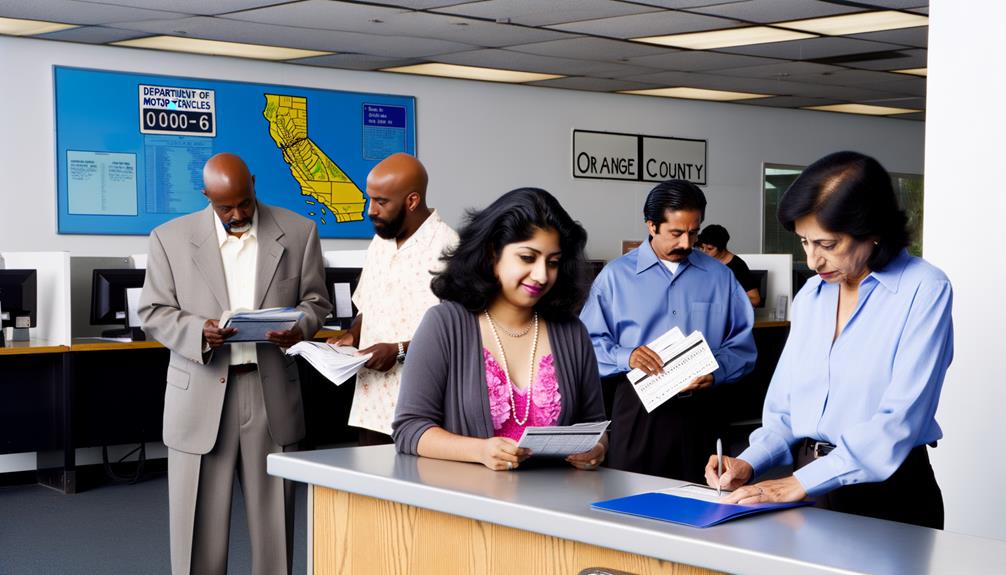
To begin the registration application process for your out-of-state car in Orange County, you'll need to complete the Application for Title or Registration (Form REG 343). This form is crucial to register a vehicle that's been previously registered in another state. Alongside Form REG 343, make sure to submit your previous out-of-state title and registration certificate.
Additionally, securing proof of insurance from a California-based provider is essential. This ensures compliance with state regulations, safeguarding your freedom to drive worry-free.
Remember, a valid smog certificate is also required unless your vehicle is electric. This certificate is a testament to your vehicle's environmental compliance, an important step in maintaining California's air quality standards.
You must also schedule an appointment at your local DMV office, as walk-ins mightn't be accommodated. During this appointment, a thorough physical inspection of your vehicle will be conducted. This inspection verifies the VIN and engine number, integral for confirming the vehicle's identity and legality.
Upon successful verification, the DMV will issue the necessary registration materials. With these steps, you'll transition smoothly into being a registered driver in Orange County, embracing the new roads with confidence and legal assurance.
Fee and Tax Information
Once you've initiated the registration process, you'll need to consider the various fees and taxes associated with registering your out-of-state car in Orange County. Understanding these costs is crucial as they can significantly affect your budget and compliance as a new resident of California.
Here's a breakdown of what you might expect:
- Registration Fee: Starting at $74, this fee includes a $3 alternative fuel fee. The total cost can vary depending on your vehicle's value, weight, and location within the state.
- Sales Tax: California's base rate is 7.25%, but it can be as high as 10% in certain counties. If you haven't paid sales tax in another state, this might be applicable during your out-of-state vehicle registrations.
- Additional Fees: Expect to pay a $32 California Highway Patrol fee and a $20 smog abatement fee. Also, watch out for late registration fees if you don't register within 20 days after moving.
To avoid surprises, use the DMV fee calculator online to estimate the total costs. This tool helps you account for all potential expenses, ensuring you're fully prepared to register your vehicle without any hassle.
Additional Registration Scenarios
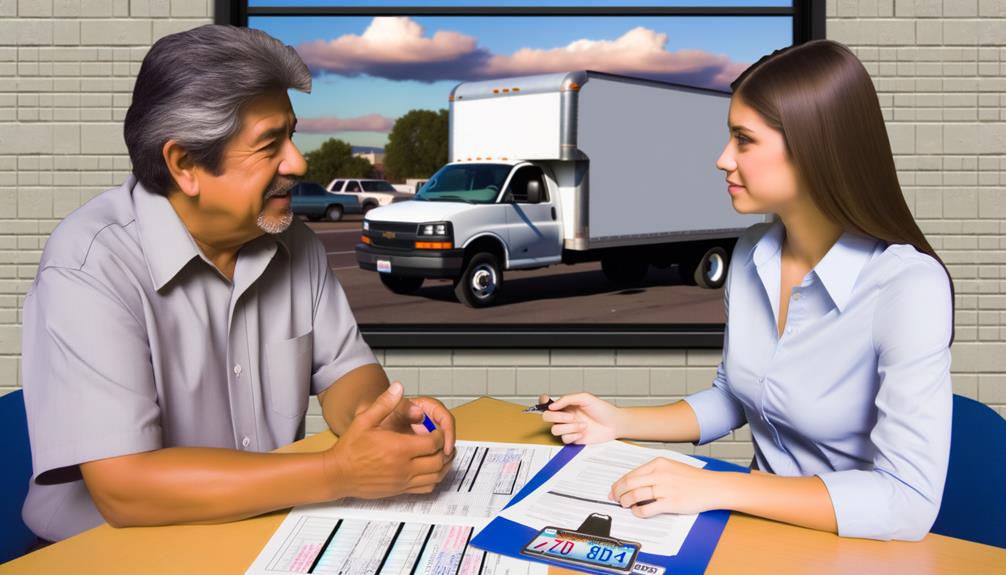
While you get ready to manage the fees and taxes for your car's registration, it's also important to be aware of specific scenarios that could affect the process. If you've recently bought a vehicle from a private seller, remember, you've got just 10 days to register it in California to dodge late fees. This quick turnaround ensures you're in good standing and avoids unnecessary penalties.
Now, let's talk about the smog check requirement. Many vehicles, unless exempt due to their age or type, must pass a smog test. You'll need to present a valid smog certificate at the time of registration. This ensures your car meets California's environmental standards, keeping the air clean and your vehicle legally compliant.
For those of you who are new residents, welcome! You've got a 20-day window to register your out-of-state vehicle upon establishing residency. This involves submitting a completed REG 343 form for personal vehicles or REG 4017 for trailers.
Additionally, all applicable registration fees, including a minimum California sales tax of 7.25%, must be settled. Don't forget, a VIN verification (Form REG 31) is mandatory, confirming that your vehicle's details match those on your ownership documents.
Visiting the DMV Office
Before heading to the DMV office in Orange County for your out-of-state car registration, make sure you've gathered all necessary documents. This preparation will streamline your visit, ensuring you're not turned away or delayed due to missing paperwork.
When you're ready to register your car, consider these critical steps:
- Schedule an appointment: Visiting the Department of Motor Vehicles without an appointment can be a hassle. Save time and frustration by scheduling your visit online. This ensures you get prompt service tailored to your registration needs.
- Prepare for VIN inspection: Your vehicle will undergo a thorough VIN inspection. This process verifies the vehicle's identification number, engine number, and odometer reading. It's a crucial step to confirm your car meets all legal requirements.
- Bring required documents: Ensure you have your completed Application for Title or Registration (Form REG 343), proof of insurance, out-of-state title, and registration certificate. If your vehicle is from 1976 or later, also bring a valid smog certificate.
Frequently Asked Questions
How Do I Register My Car in California While Out of State?
To register your car in California while out of state, you'll need to meet residency requirements, complete online registration, and ensure insurance verification. Also, prepare for vehicle inspection, title transfer, and registration fees.
Can I Register My Car in California Without a California License?
Yes, you can register your car in California without a state license by meeting California residency requirements, providing proof of insurance, and complying with emissions regulations through the California DMV process.
How to Register a Car in Florida From Out of State?
To register your out-of-state vehicle in Florida, you'll need to complete a title transfer process, provide insurance documentation, and meet Florida registration requirements at DMV offices. Expect vehicle inspection rules and registration fees overview.
What Is the Easiest State to Register a Car In?
For the easiest car registration, Vermont's your best bet. No vehicle inspections or residency proof needed, and you can handle title transfers and applications online, dodging hefty tax implications and cumbersome DMV processes.

